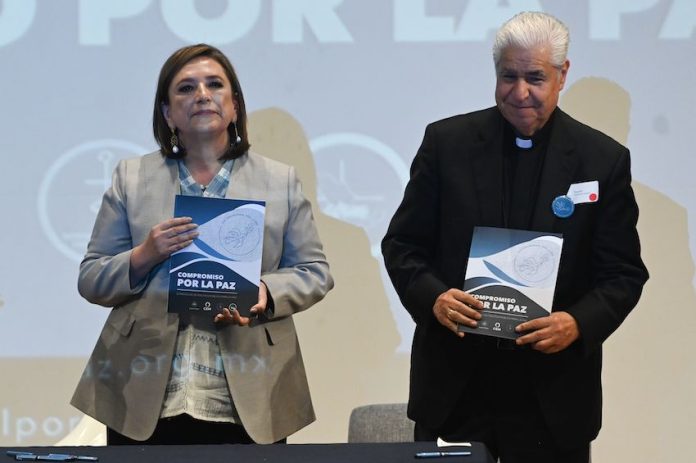Each of Mexico’s three presidential candidates has endorsed a “Commitment for Peace” document drawn up by Mexico’s Roman Catholic leadership, although leading aspirant Claudia Sheinbaum also expressed disagreement with the Church leaders’ assessment of the current security situation and some of the peace-building proposals they put forth.
Developed by the Mexican Episcopal Conference (CEM) and presented at an event on Monday, the Commitment for Peace strategy contains more than 100 proposals. Among them are:
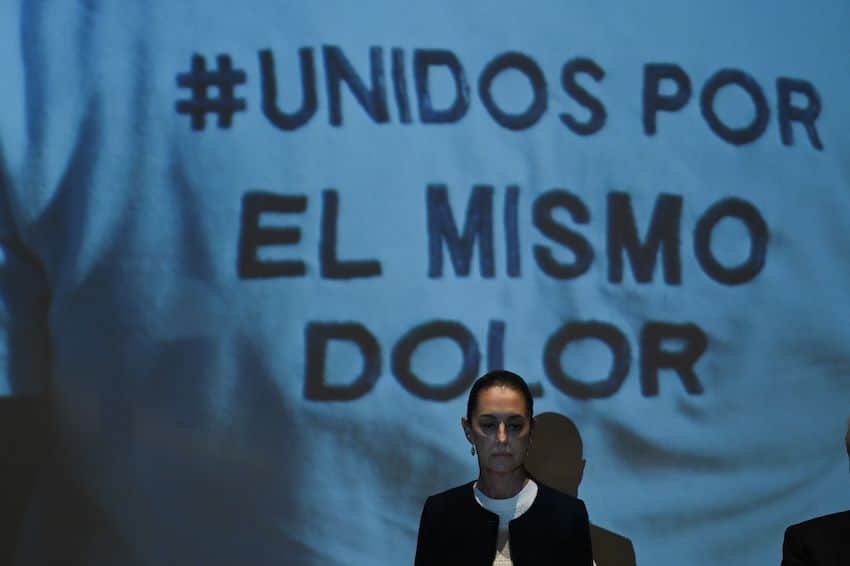
- the gradual demilitarization of public security work
- the social reintegration of members of local crime groups
- the implementation of an “international mechanism” against impunity
- the protection and strengthening of autonomous government bodies
- additional investment aimed at bolstering municipal police forces and the National Search Commission.
The proposals are spread across seven different areas: social fabric; security; justice; prisons; adolescents; governance; and human rights.
“With the conviction to not rest until the conditions to build peace in the country have been created, we present this Commitment for Peace, a route of collective action with an interdisciplinary, co-responsible and articulated perspective that seeks to tackle in an effective way the profound crisis of violence and social breakdown that afflicts our country,” the document said.
On Monday, Monterrey Archbishop and CEM President Rogelio Cabrera López told attendees of an event in Mexico City that the Catholic Church and a peace-building “movement” of more than 20,000 people are filled with “profound hope” for a peaceful Mexico as a result of having the opportunity to meet with the presidential candidates.
“We have witnessed the outcry of the victims [of violence],” he said.
“For the Church, an inflection point occurred more than 20 months ago when our dear Jesuit priests Javier [Campos] and Joaquín [Mora] were murdered in Cerocahui, Chihuahua. … Since then, we undertook decisive actions that began with days of prayer and transformed into a national movement for justice and security,” Cabrera said.
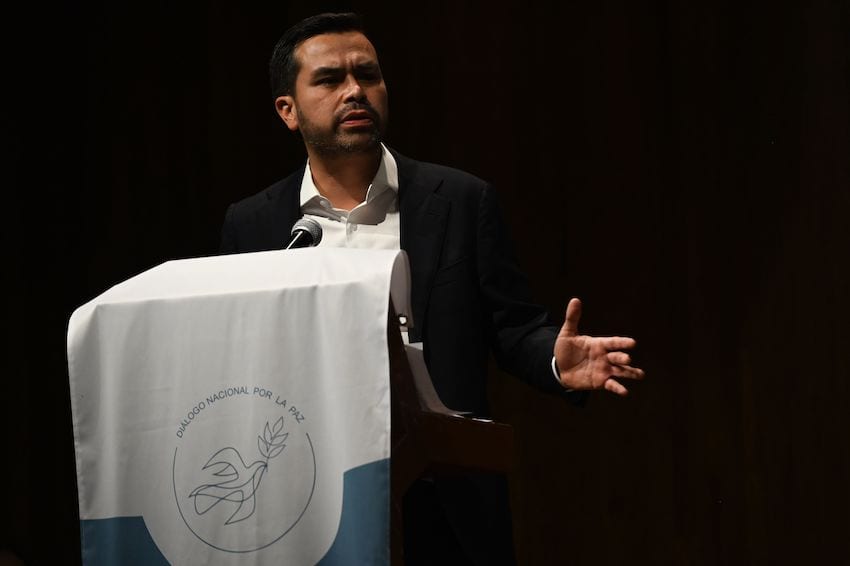
Some bishops have even sought to promote and actively participate in peacebuilding at the local level, such as those in the southern state of Guerrero who have attempted to broker a truce between feuding criminal groups.
Sheinbaum signs commitment but doesn’t agree with “the description of the problem”
At the CEM event, the ruling Morena party candidate and heavy favorite to win the June 2 election signed the 53-page Commitment for Peace but stressed that she didn’t agree with all of its contents.
“I’m signing the document with the understanding that there is a joint vision for building peace. However, there are several assertions and proposals with which I don’t agree,” Sheinbaum said.
The former Mexico City mayor and protege of President Andrés Manuel López Obrador noted that she was annexing a document to the Commitment for Peace that she signed. The document outlines her agreement and differences with the CEM plan.
“I don’t agree with the description of the insecurity problem,” Sheinbaum said, rejecting the document’s assertion that there is a “profound crisis of violence” in Mexico, even though homicide numbers remain very high.
“I don’t share the pessimistic assessment of the current moment. … Nor do I agree with some proposals that assume that there is no reliable data in the National Security System,” she said.
Sheinbaum also said that she doesn’t agree with “references to a supposed militarization” of Mexico nor with assertions that the state has only a minimal security presence in some parts of the country. In addition, she rejected the claim that there is a prevailing sense of “fear, impotence, mistrust and uncertainty” in Mexico.
Following the lead of his most recent predecessors, López Obrador has used the armed forces for public security — and a wide range of other nontraditional tasks, including infrastructure construction and the management of customs and ports.
Despite that, he has rejected claims that he has militarized the country, and in 2021 dismissed an assertion by a U.S. military official that criminal organizations control “ungoverned areas” of Mexico that account for about one-third of the country’s territory.
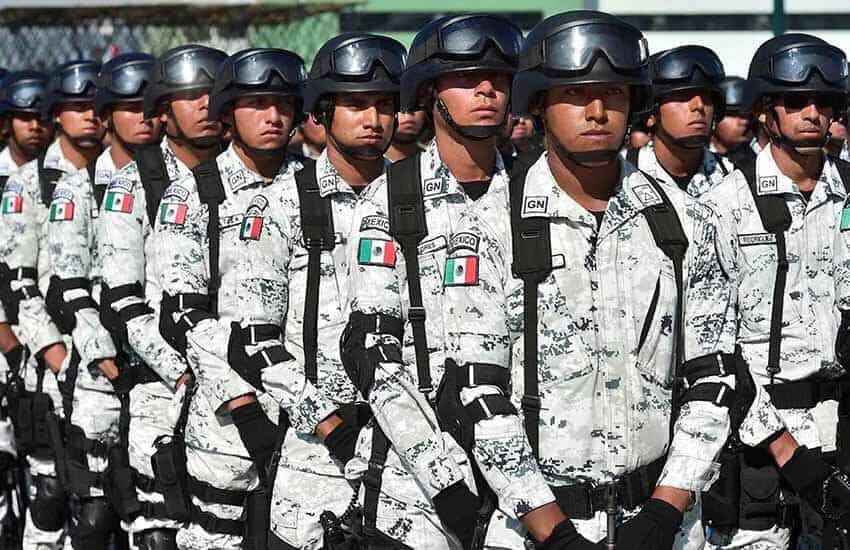
In addition to agreeing with the president on those two points, Sheinbaum shares López Obrador’s view that the National Guard should be a military rather than civilian security force, despite a Supreme Court ruling that such an arrangement is unconstitutional.
The Commitment for Peace recommends that the Guard be a civilian entity.
Sheinbaum also rejected another proposal in the document to increase funding for the judiciary, which she argued is guilty of squandering the resources it currently receives.
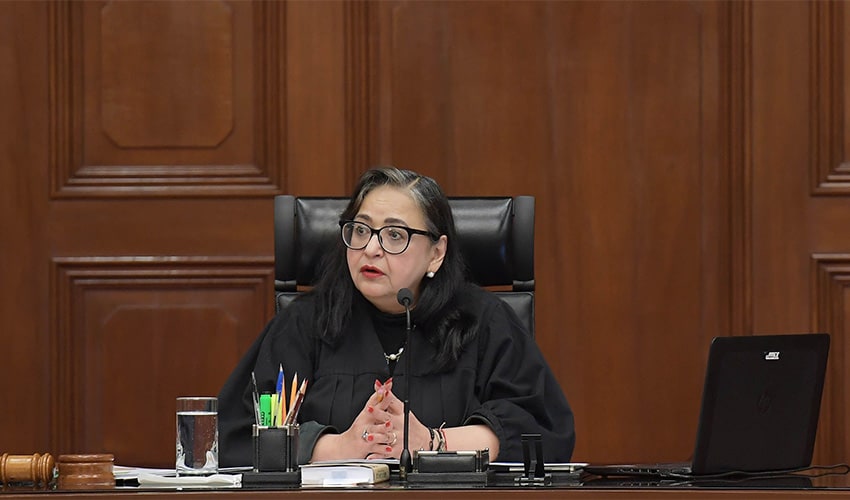
She did, however, express support for another proposal — to build peace by addressing the root causes of violence. López Obrador asserts that the government is doing this with its controversial “hugs, not bullets” security strategy, in which “hugs” is a metaphor for welfare and employment programs and the “not bullets” part refers to a commitment to avoiding violent confrontation with criminals where possible.
Sheinbaum is also committed to a proposed judicial reform that would allow citizens to elect Supreme Court justices and other judges directly. She also supports strengthening the National Guard and state police forces in order to increase their investigative capacity.
Gálvez finds “perfect harmony” with her own security agenda
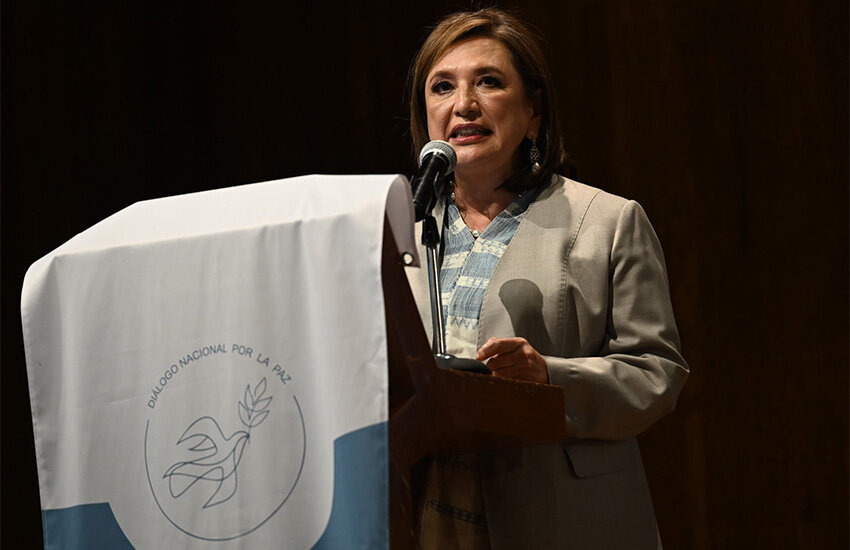
Xóchitl Gálvez, presidential candidate for a three-party opposition alliance — and Sheinbaum’s main rival — also met with Catholic Church leaders at the National Autonomous University’s Cultural Center in Tlatelolco.
“I find perfect harmony and agreement with what I’ve been proposing,” said Gálvez, who declared that “a Mexico without fear is possible” when outlining her security plan at her campaign launch on March 1.
The former National Action Party senator said that the most important of the CEM’s proposals is the one to demilitarize the government. She previously said that she would continue using the armed forces for public security tasks but relieve them of other duties, such as building infrastructure, fixing roads and running hotels.
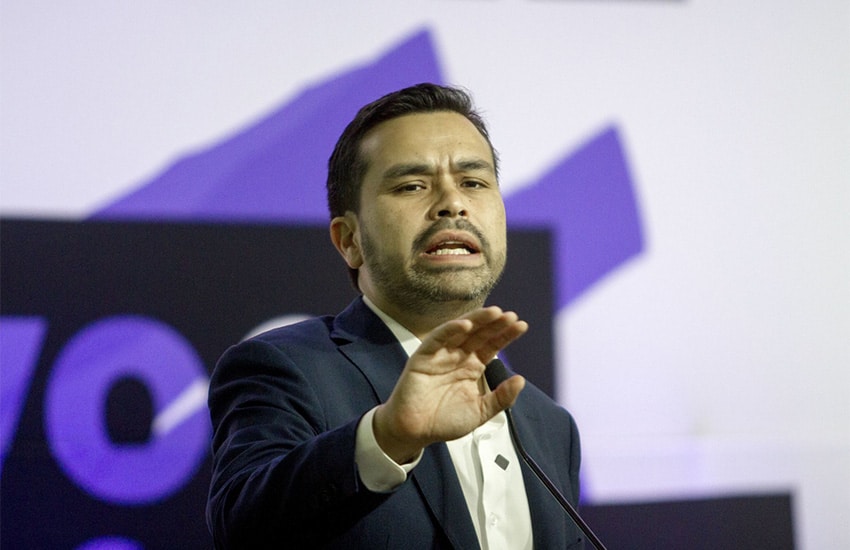
Gálvez, who trailed Sheinbaum by almost 24 points in one recent poll, committed to meeting with Church leaders to discuss their peace proposals the day after she is sworn in as Mexico’s first female president.
“On Oct. 2, I’ll meet with you, not as a candidate but as president, to have the first working session — dialogue and listening to commitments for peace,” she said.
Gálvez has pledged to increase the size of the National Guard and develop its capacity to investigate crimes and arrest criminals.
“Hugs for criminals are over. The law will be applied to them,” she said on March 1.
Among the other aspects of her security strategy are plans to increase funding for states to improve their crime-fighting capacity and to pay police higher salaries.
Álvarez Máynez embraces the strategy change that Mexico “urgently needs”
The third presidential candidate, Jorge Álvarez Máynez of the Citizens Movement (MC) party, told bishops that both he and his party would support the Commitment for Peace.
MC candidates for the Senate and Chamber of Deputies will also support “this vision for strategy change that the country urgently needs,” said the 38-year-old former lawmaker.
Álvarez Máynez, who is currently at a distant third in the polls, accused both Sheinbaum and Gálvez of “being responsible for perpetuating” failed security strategies.
Neither Sheinbaum nor Gálvez has been involved in security matters at a federal level.
The event on Monday was the first in which all three presidential candidates participated, although they attended at different times and thus weren’t pitted against each other in any way.
The aspirants will meet face-to-face at three presidential debates, two of which will be held in April, with a third to follow in May.
Crime and insecurity, and a range of other topics — including health, education, the fight against corruption and the economy — are set to be considered at the three debates, to be held in Mexico City.
With reports from Milenio, La Jornada and Proceso
